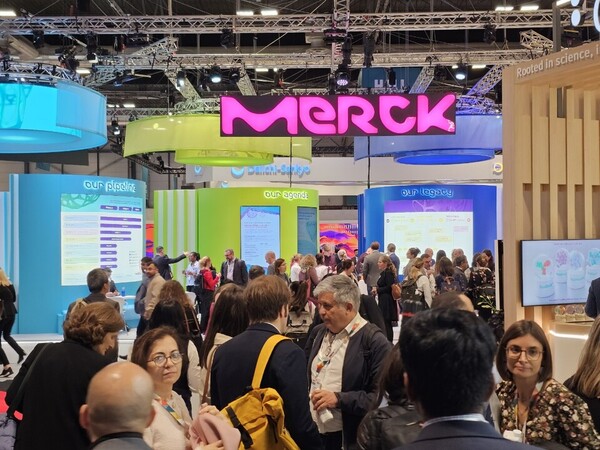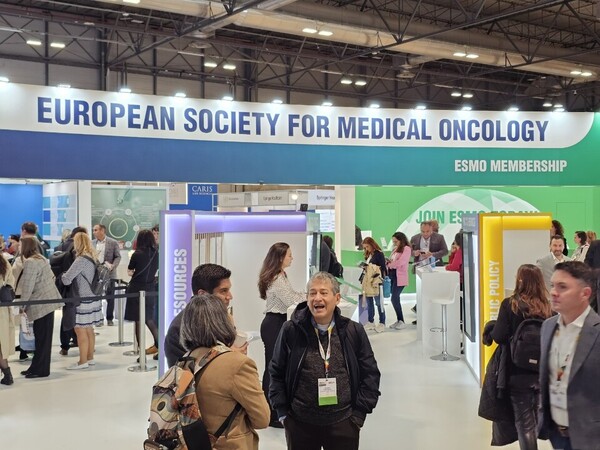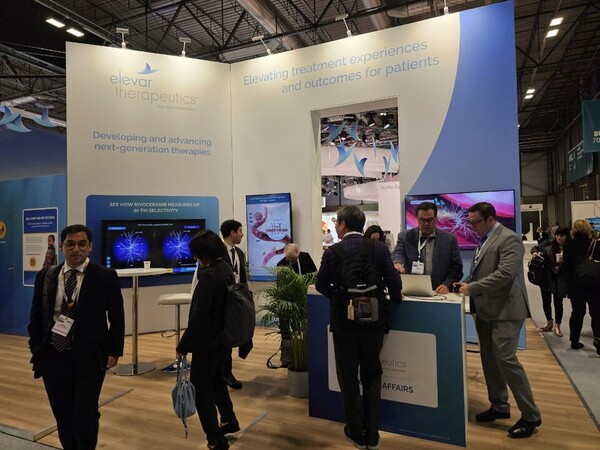
MADRID -- By Kim Chan-hyuk Korea Biomedical Review correspondent -- The curtain has risen on the European Society for Medical Oncology's Annual Congress (ESMO 2023) at the IFEMA Convention Center in Madrid.
ESMO is the largest cancer society in Europe and one of the top three cancer societies in the world, along with the American Society of Clinical Oncology (ASCO) and the American Association of Cancer Research (AACR). Its membership includes more than 30,000 oncology professionals from 168 countries.
In particular, the annual congress, which rotates through Europe annually, brings together global pharmaceutical companies, biotechnology companies, and drug development researchers to share the latest research results and discuss business cooperation.
Emmanuel Merck Darmstadt (MED), MSD, AbbVie, Regeneron, GSK, Daiichi Sankyo, Takeda, Eisai, Roche, Novartis, AstraZeneca, BMS, Pfizer, Eli Lilly, Amgen, Johnson & Johnson, Gilead, Sanofi, Astellas Pharma, and Seegene were among the major participants that set up independent booths and greeted visitors at the event.

From Korea, Elevar Therapeutics, a U.S. subsidiary of HLB, runs a booth to discuss partnerships for Rivoceranib distribution and sales in Europe. In May, Elevar submitted a marketing authorization application to the U.S. Food and Drug Administration for the targeted anticancer drug Rivoceranib, as a first-line treatment for liver cancer.
During the event, research and clinical data of candidates being developed by Korean companies, including Yuhan Corp., Hanmi Pharm, Lunit, Medpacto, Curocell, Sillajen, TiumBio, GI Innovation, Voronoi, ABL Bio, Therapex Bio, and CytoGen will also be presented.
While the abstracts of each research paper were released before the event’s opening, attention was focused on the full phase 3 data of the combination therapy of Leclaza (lazertinib) and Janssen's targeted anti-cancer drug Rybrevant (amivantamab), released on Monday (local time).
Janssen, which holds global rights to Leclaza, has said it would apply for combination therapy as a first-line treatment in the U.S. and Europe later this year.

Unlike in the past, Korean companies significantly reduced their booths, as major biosimilar companies, such as Celltrion and Samsung Bioepis, did not participate in the event. The biosimilar companies said they had no special "content" to show at the oncology conference this year.
Celltrion, which initially decided to participate in ESMO, reportedly withdrew its plans after the formalization of the Celltrion Group merger.
It comes in stark contrast to its participation in ESMO 2022 in Paris, where the company promoted anticancer drug biosimilars, including Rituxan/Mabthera biosimilar Truxima (rituximab), Herceptin biosimilar Herzuma (trastuzumab), and Avastin biosimilar Vegzelma (bevacizumab.
"Although clinical trials in the field of cancer continue, we do not attend the same event every year, and we decide whether to attend the conference based on the importance of the conference, product launch, and clinical results," a Celltrion official said.
Related articles
- [ESMO 2023] ‘HLB will apply for European authorization for rivoceranib this year’
- [ESMO 2023] Keytruda cements its position as 1st-line treatment for HER2+ gastric cancer
- [ESMO 2023] Lunit, Medpacto, TiumBio present research results at ESMO 2023
- [ESMO 2023] Keytruda-Padcev combo takes 'crown’ as 1st-line cure for urothelial cancer
- [ESMO 2023] Yuhan's NSCLC drug Leclaza shows potential as 1st Korean blockbuster drug
- [ESMO 2023] Has Korean CAR-T treatment Anbal-cel won the greenlight at ESMO?
- [CPHI 2023] Prestige Biopharma embraces open innovation for new antibody drugs
- [ESMO 2023] GI Innovation lays ground for Keytruda’s clinical trials

